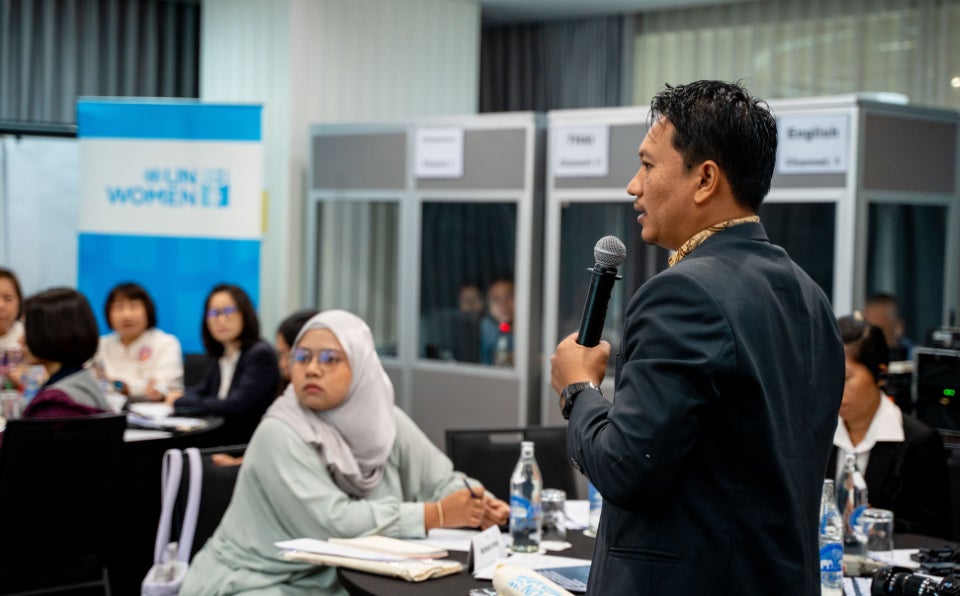UN Women initiative strengthens women’s leadership in digital security training in South-East Asia
Date:
A UN Women-led training is strengthening digital security and cyber-resilience of gender equality and women’s rights advocates and incorporates a women, peace and security approach. Photos: UN Women/Ploy Phutpheng
A first cohort of trainers has been empowered to deliver innovative training developed by UN Women and the UN University Institute in Macau (UNU Macau) to strengthen women’s leadership in preventing online harms, cybersecurity threats and the malicious use of technology in South-East Asia.
The Training of Trainers Workshop to Strengthen Digital Security and Cyber-resilience of Gender Equality and Women’s Rights Advocates took place from 27 to 28 March 2024 in Bangkok, Thailand, and attracted 20 participants from civil society and non-governmental organizations, and academic institutions in Thailand and Viet Nam.
The training materials are developed from research conducted by UN Women and UNU Macau over the past two years on digital- and cybersecurity and artificial intelligence (AI) in the context of the women, peace and security (WPS) agenda, and consultations with women’s rights advocates.
“We’ve come from a stage where very little was known on the intersection between gender, peace and digital security in Thailand and Viet Nam, to having substantive research and practical training tools which will be rolled-out on a larger scale,” said Naruedee Janthasing, Programme Analyst, UN Women Thailand.
With the aim of strengthening digital security practices for women and persons with diverse gender identities in the region, the training was organized by UN Women as part of the “Women, Peace and Cybersecurity: Promoting Women’s Peace and Security in the Digital World” project in partnership with UNU Macau and the Government of Australia through their Cyber and Critical Tech Cooperation Program.
“In the cyber space, Australia is working with UN agencies, non-governmental organizations, business and development organizations to progress gender equality, and disability and social inclusion, so that cyber governance is more responsive, credible and effective, and to focus on closing the digital divide to ensure no one is left behind,” said Jane Racancoj, Political and Economic Counsellor, Australian Embassy in Thailand, during the workshop opening.
“That is why the Australian Government is proud to support UN Women to do this important research, tools development and training,” said Ms Racancoj.
Digital platforms are increasingly being used to spread disinformation, hate-speech, misogynistic and radicalizing content, and to facilitate illicit activities such as trafficking and sexual exploitation, which disproportionately affect women.
The innovative training materials have been developed in response to such challenges and cover foundation concepts in digital security, artificial intelligence, gender and peace. The materials are also designed to expand knowledge on cyber threats, data protection, risk management, generative artificial intelligence (AI) and gender bias in AI, among other topics.
E-Learning modules are being finalised on cyber hygiene (measures to maintain the security of data systems and their users) for women’s civil society and non-governmental organizations, and women human rights defenders, and on artificial intelligence in the context of the WPS agenda.
“Utilising the knowledge and experiences of women and girls and building digital skills and capacities is fundamental to creating safe online spaces for everyone. We cannot make effective progress towards gender equality without digital empowerment,” said Jaimee Stuart, Senior Researcher at UNU Macau, who co-led the training of trainers.
The online modules were piloted by key local and regional partners during a digital security workshop hosted by UN Women in September 2023 in Bangkok. Since then, UN Women and UNU Macau have been refining the contents to respond to partner feedback.

A participant at both workshops, Waeismaael Nasae, President of People’s College in Thailand’s Southern Border province, said he could never have imagined the rapid changes in the digital world and how far artificial intelligence (AI) has come.
“This training will be important for the community in our local area because there has never been any training on digital security. Many people are using technology every day, yet they don't realize the risks and how to manage them. Drawing from the training modules developed by UN Women and UNU, we are formulating our own curriculum tailored to our target groups, including women and men working on human rights, peace and support for vulnerable people,” said Mr Nasae.
To make the training content suitable for guided online-trainings as well as hybrid and in-person sessions, facilitator’s handbooks are being developed to complement the e-Learning modules.
The suite of materials – including the online modules and handbooks available in Thai, Vietnamese and English – will be launched in May 2024 and publicly available.
“This course is amazing. As a lecturer in Informatic Technology and AI at the Hanoi University of Industry and a member of the National University’s AI research team, this is very timely for me. I will research into how to bring the issues of digital humanities into our training curriculum, that should include gender equality and women empowerment in IT and AI sectors, too,” said Ms Luong Thi Hong Lan, Lecturer, Hanoi University of Industry.
The main audiences for the training are digital rights, civil society and non-governmental organizations, members of the UN Women-facilitated Women, Peace and Cybersecurity Regional Civil Society Network, as well as academic institutions, training centres and other organizations aiming to advance gender equality and women’s empowerment.
This training initiative is contributing to increased awareness and knowledge of the implications and opportunities of cybersecurity and emerging technologies for implementing the WPS agenda in the region.
For more information about this pioneering training, please contact [ Click to reveal ].
See workshop Flickr album.



